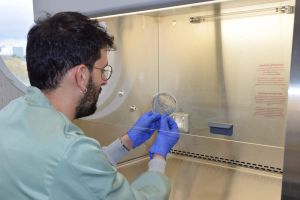Investigadores del CNB- CSIC trabajan para acabar con este problema desde distintas perspectivas. Daniel López (CNB-CSIC), investiga nuevos tratamientos mediante la combinación de moléculas con antibióticos en desuso para contrarrestar la resistencia de las superbacterias. En concreto, están estudiando cómo la perturbación de la arquitectura de unas regiones concretas de las superbacterias causa una alteración en el ensamblaje de las proteínas que llevan a cabo. Puesto que muchos de estos grandes complejos proteicos juegan un papel importante en la resistencia a los antibióticos, cuando se altera la arquitectura de estas zonas, las superbacterias dejan de serlo y se convierten en cepas convencionales sensibles a los antibióticos más comunes. Por su parte, Álvaro San Millán (CNB-CSIC) impulsa estudios sobre los plásmidos, unos elementos genéticos móviles responsables de que los mecanismos de resistencia se diseminen entre las bacterias. Estos trabajos podrían consolidar las bases para el desarrollo de nuevas terapias contra las bacterias portadoras de estos plásmidos de resistencia.
Las consecuencias de la resistencia a los antibióticos también se reflejan en el medio ambiente. Científicos del CSIC en el Centro de Investigación en Sanidad Animal del Instituto Nacional de Investigaciones Agrarias (INIA- CSIC), liderados por Ana de la Torre, han creado un mapa de vulnerabilidad de los suelos frente a la presencia de antibióticos y de biorresistencias. Y se han determinado las mejores especies de plantas centinela para vigilar la presencia de antibióticos en el medio ambiente. Victoria Moreno, investigadora del CSIC en el Instituto de Investigación en Ciencias de la Alimentación (CIAL-CSIC-UAM), estudia cómo los cambios en la microbiota intestinal, el conjunto de microorganismos que habitan el intestino, pueden relacionarse con enfermedades como la celiaquía y la enfermedad inflamatoria intestinal. El gran desafío científico que se plantea en los próximos años en este ámbito es el desarrollo de ingredientes, alimentos y hábitos dietéticos efectivos en el cuidado de la microbiota y particularizados a individuos o grupos poblacionales específicos.Con el objetivo del reducir el uso de antibióticos, el equipo de Fernando Herranz en el Instituto de Química Médica (IQM-CSIC) investiga en terapias que emplean nanomedicina para entrenar a las defensas del organismo y mejorar con ello su respuesta ante bacterias resistentes. Por otro lado, Pilar García, investigadora del CSIC en el Instituto de Productos Lácteos de Asturias (IPLA-CSIC), utiliza virus bacteriófagos para disminuir y controlar la dispersión de bacterias resistentes.
San Millán, López, Moreno, Herranz, de la Torre y García acompañarán a los participantes en la primera jornada Cicerón sobre resistencia a antibióticos. Durante las sesiones científicas que impartirán en la Librería Científica del CSIC, profundizarán en las investigaciones que están llevando a cabo y resolverán las diferentes cuestiones planteadas por los asistentes.
El CSIC quiere mostrar la ciencia que desarrolla en sus laboratorios para hacerla llegar a los gestores políticos, las empresas, los periodistas y otros agentes sociales, para potenciar la contribución de la ciencia y la innovación en la resolución de desafíos, alineados con el objetivo europeo de Autonomía Estratégica, concretamente con los cuatros pilares establecidos en dicho objetivo: salud, digital, alimentos y energía. Dentro de cada uno de ellos, se seleccionarán temáticas concretas de interés, como la creciente resistencia de las bacterias frente a los antibióticos, los materiales sostenibles, la alimentación saludable y la generación de energía sostenible.Con este objetivo, el CSIC lanza el programa Cicerón, que consiste en una serie de jornadas temáticas en las que se invita a políticos, empresarios y periodistas para visitar el CSIC y conocer sus investigaciones en torno a un desafío social.






